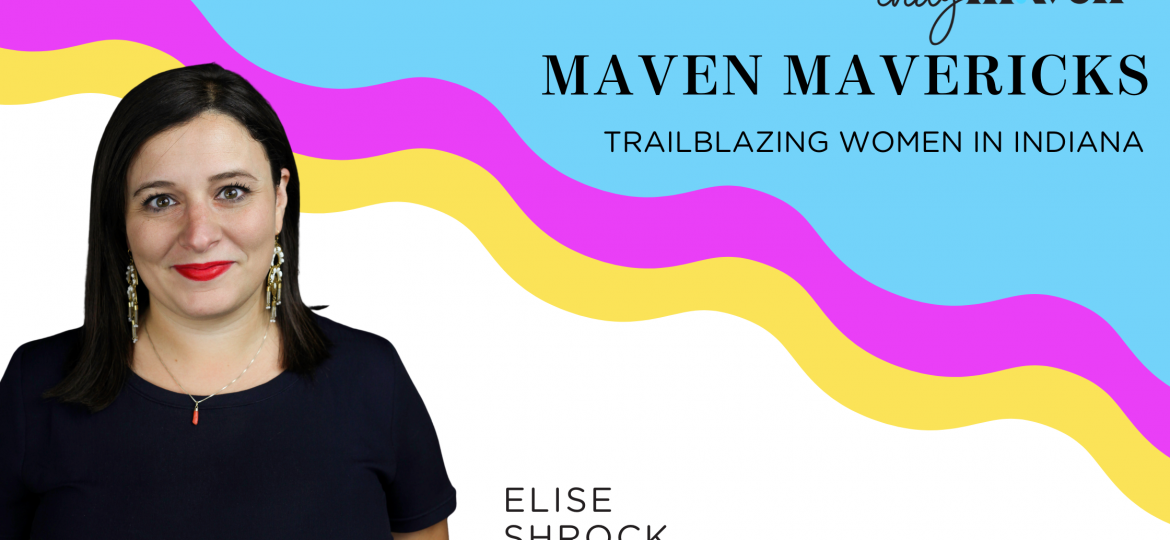
In 2024—243 years after the Articles of Confederation established Congress as the sole body of the legislature—women still hold only 28% of the 535 seats in Congress and have yet to serve in the highest leadership position in the country.
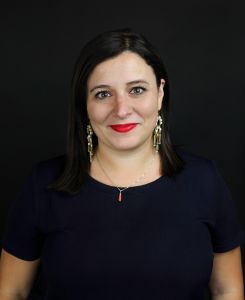
Elise Shrock has been working in politics for over two decades and is not only a personal testament to what women can accomplish in the long-time male-dominated space—she has also contributed meaningfully to the advancement of women in politics across the state of Indiana.
Gaining her first real experience working on a campaign in Howard County in 2004, Shrock has since contributed to numerous campaigns, worked at the statehouse as deputy chief of staff and communications director, as a lobbyist, and regularly contributes to public political content through networks like NPR.
Not only has she been paving her own way through the political space, she’s been intent on making progress for other minority communities along the way. One of Shrock’s proudest accomplishments as deputy chief of staff and communications director for the Indiana Senate Democratic Caucus was creating the Indiana Senate Latino Roundtable alongside her then-colleague Peg McLeish.
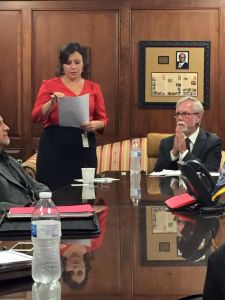
Coming from a Hispanic family herself, Shrock shared, “There were a number of really harmful bills that had passed, and I kept hearing non-Hispanic people saying what they thought we should do about it. I had to step in and say, ‘Have you asked a Latino or Hispanic person what they need?’”
When the answer was “No,” it was clear she needed to create a space for leaders across Indiana to come together and hear from community leaders with the experience to guide them more properly. From this group, state legislators passed bills that allowed Hoosiers of various immigration statuses to gain access to better healthcare treatments and helped more students receive state tuition.
“There are still so many women doing the work who are on staff in the Statehouse, on staff in lobby firms… Whether or not they get the credit is a different story.”
How Misogyny Manifests in Government
Shrock made her mark in the Indiana Statehouse for several years and then began working with a local lobbying organization. When asked about some poignant examples of how misogyny manifests in government work, she shared the following stories about her lobbying days.
“When you’re a lobbyist, it’s a lot of ‘hurry up and wait.’ I was standing outside of the Chamber, talking to a group of men and I told a joke. No one laughed and just kept talking, and 45 seconds later—like it had popped into his brain as if it was his own thought—one of the guys in the group said the exact same thing and everyone in the group responded with laughter.”
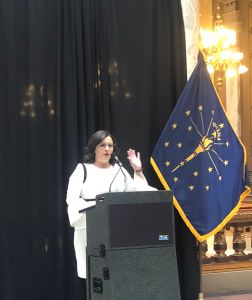
Shrock described an environment where women consistently do the work and constantly feel unseen and unheard. She shared, “I regularly had men in the statehouse tell me, ‘Oh yeah, I forget you’re lobbying,’ and I had been a lobbyist for three years.”
Not only do women have to fight to make their voices heard and receive recognition for their work, they are held to sexist double standards. “Fun” fact: women weren’t allowed to wear pants on the U.S. Senate floor until 1993.
And the frustration is not just about annoying microaggressions and outfits. It’s about challenging traditional gender roles, managing outdated expectations, and gaining the respect needed to lead.
One of Shrock’s former legislative friends regularly says that when she tried to run for higher office, people would always mention that it was nice that her husband would “babysit” her kids while she was on the campaign trail… as if they weren’t his kids, too.
This was just in the past five years.
Moving Hoosier Women Forward
After the 2016 election, several women in leadership positions who had been very involved in politics decided it was time to build a formal leadership program for Democratic women.
Shrock described the strong leadership of Liane Hulka, who worked to develop the founding board of Hoosier Women Forward, recruiting 21 women from across the state with an eye on inclusiveness. “It was really important for us starting out to not just have cultural and racial diversity, but to also have geographic diversity,” Shrock shared.
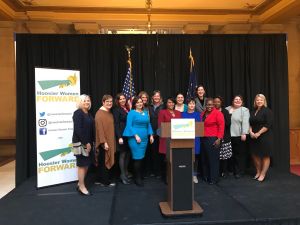
This meant the founding board had to work together to develop a program that everyone could support, one that would be relevant to the moment.
Shrock described the working environment of the founders: “In politics, there is always going to be tension and it’s not always with the other party. Whenever power is at play, tension is at play, and I think Hoosier Women Forward has become a great example of how to use that in a positive way so we can share ideas and come to a consensus on how to move forward together. I think women are collaborative in that way, so that’s kind of become our super power.”
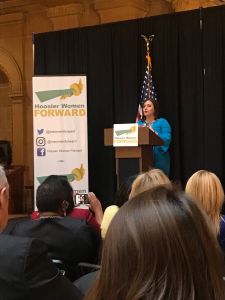
The Republican Party hosts the Lugar Series, offering leadership training experience to encourage, mentor, and prepare women leaders across the state to seek new levels of personal achievement and public involvement. The Lugar Series was established in 1990 and, in a wonderful bipartisan moment for women in Indiana, the founding Hoosier Women forward team sought out and received helpful advice from the Lugar Series leadership team as they planned out their own program.
After two years of hard work, the Hoosier Women Forward program was formally created and launched in 2018. Shrock served as a founding board member, the chair of the communications committee, and in 2024, now serves as board chair.
Simply stated, Shrock describes the program as, “Teaching women how to show up in every space and be a leader and to communicate that Democrat values make sense in our communities.”
“When one of our women walks into a room, she brings over a hundred women with her every time.”
RELATED: HOW THESE 4 INDIANAPOLIS-AREA WOMEN ARE HELPING MENTOR FUTURE LEADERS
The Impact of These Political Mavens
The program has grown beyond what the board originally thought it would become, and much quicker than they thought it could. Hoosier Women Forward has hosted six cohorts, and 133 women have completed the program as of May 2024.
“We not only give our women the hard skills to do the work, we give them a network of women to keep them supported and we do a lot of self-reflection to help them build their confidence in their individual leadership styles,” Shrock shared about the program’s power. “When one of our women walks into a room, she brings over a hundred women with her every time.”
In addition to women already working in politics, the professional backgrounds of the participants in this program run the gamut, including published authors, restaurant owners, union electricians, nonprofit leaders, marketing managers, and community activists and advocates focused on a wide variety of issues.
Through study, field experience, and networking, the participants gain valuable political leadership training that prepares them to become more informed, active, and mindful public servants.
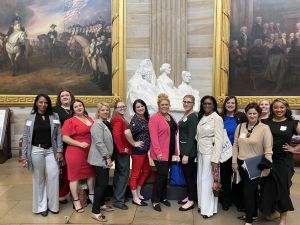
For example, each year, the cohort travels to Washington, D.C., where they’re afforded the opportunity to walk into high-level political spaces—multiple visits to the White House (including the Briefing Room and face-time with the Press Secretary), Capitol Hill, and the Speaker’s Office.
“The common sense from our women is they feel so lucky to have that opportunity, but I like to remind them that the people we meet are lucky to get to know them because they are the people in Indiana doing the work and fighting the fight on the ground level,” Shrock pointed out.
As a result, this program has inspired many women to run for public office, and Hoosier Women Forward graduates have a 78% win rate when they do run.
In 2023 alone, twelve graduates won their elections, including a historic win by Deborah Whitfield, the new Mayor of Lawrence and the first Black mayor and first woman mayor in Marion County.
Note: Applications are live for the next cohort and are due June 18, 2024.
“Sometimes, we need reminders not to accept the status quo.”
Shrock’s Advice for Other Trailblazing Mavens
Shrock pointed to her personal network of women as her most valuable resource when asked about her advice for other women blazing trails in male-dominated spaces.

“One of the most important things for my personal and professional well-being are the women I surround myself with. When you’re in a male dominated field and just grinding away, it’s easy to suffer in silence, and because society is set up against you, you just accept the way things are,” Shrock explained.
She shared that the women around her remind her that misogynistic situations are not ok and validate her feeling of frustration in a way that empowers her to hold a harder boundary or speak up for herself. “I need someone else to come up beside me and say, ‘It doesn’t have to be that way,’ or, ‘They shouldn’t do that to you.’ It’s helped to reinforce my voice from within. Sometimes, we need reminders not to accept the status quo.”
Shrock elaborated on creating better boundaries around her work life and placed great importance on listening to yourself, knowing when to put the work down, and making sure you’re doing things outside of work activities.
Traveling is a significant part of her life. It not only gives her a break and allows her to experience different cultures, but Shrock claims it also makes her more creative in policy making and problem solving because she gets to see how people do things differently in different places.
“I enjoy politics and advocacy, but it does not define me. I am a tia and a daughter and a friend and a church lady, and those things are so fulfilling to me. So, where most people find power in these types of institutions, I think my power lies in my community and my family.”
You can follow Shrock on her social media accounts: Facebook, Instagram, X (formerly twitter), and LinkedIn.
Tiffany Hanson is a relationship manager for Morales Group who is enthusiastic about building better futures for mavens in Indiana and beyond. You can find her on Instagram and LinkedIn.
All of our content—including this article—is completely free. However, we’d love if you would please consider supporting our journalism with an Indy Maven membership.







